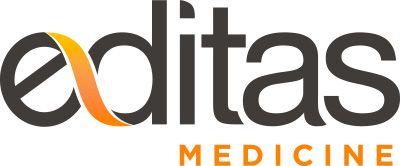Studies in non-human primates demonstrated nearly 100% gene editing and knockout of the endogenous RHO gene, and replacement protein levels of >30% using a dual-vector AAV approach
Treated eyes showed preservation of morphological and functional photoreceptors
EDIT-103 advances towards IND-ready research
CAMBRIDGE, Mass., Oct. 13, 2022 (GLOBE NEWSWIRE) — Editas Medicine, Inc. (Nasdaq: EDIT), a leading genome editing company, announced today. ex vivo When in vivo Preclinical data supporting the experimental drug EDIT-103 for the treatment of rhodopsin-associated autosomal dominant retinitis pigmentosa (RHO-adRP). The company reported these data in an oral presentation today at the European Society for Gene and Cell Therapy29.th Annual General Meeting in Edinburgh, Scotland, UK.
EDIT-103 is a mutation-independent CRISPR/Cas9-based dual AAV5 vector “knockout and replacement” (KO&R) therapy for the treatment of RHO-adRP. This approach has the potential to treat any of the over 150 dominant gain-of-function rhodopsin mutations that cause her RHO-adRP with a single subretinal administration.
“These promising preclinical data demonstrate that EDIT-103 efficiently removes the defective RHO gene responsible for RHO-adRP and maintains sufficient levels of RHO to maintain photoreceptor structure and function.” The program is on its way to the clinic,” said Mark S. Shearman, Ph.D., executive vice president and chief scientific officer of Editas Medicine. “EDIT-103 uses a dual AAV gene-editing approach and also provides an initial proof-of-concept for the treatment of other autosomal dominant disease indications that require correction of negative gain of function.”
Key findings include:
-
In human retinal explants, EDIT-103 showed highly specific editing and no off-target editing was observed after transduction.
-
and mRhohRHO/+ A mouse model, EDIT-103, achieved rapid gene editing with maximal levels at 6 weeks and sustained and stable editing until study termination (13 weeks).
-
In non-human primates (NHPs), EDIT-103 showed nearly 100% knockout of endogenous RHO, and the replacement RHO gene produced more than 30% of normal RHO protein levels in the treated area of subretinal injection .
-
EDIT-103 (KO&R)-injected NHP eyes showed restoration of RHO expression in the outer segment and preservation of normal photoreceptor structure and function compared to KO-injected eyes .
|
Presentation information: |
|
Presentation title: Mutation-independent CRISPR/Cas9-based ‘knockout and replacement’ strategy for treating rhodopsin-associated autosomal dominant retinitis pigmentosa |
|
Editas scientists have also published preclinical data for EDIT-202. poster session: |
|
Presentation title: EDIT-202, an AsCas12a and SLEEK™ gene-edited iPSC-derived NK cell therapy, maintains long-term persistence, high cytotoxicity, and enhanced in vivo control of solid tumors. |
For more information on the Editas Medicine presentation, visit posters and presentations Sections of our website.
About EDIT-103
EDIT-103 is an experimental CRISPR/Cas9-based drug in preclinical development for the treatment of rhodopsin-associated autosomal dominant retinitis pigmentosa (RHO-adRP), an advanced form of retinal degeneration. EDIT-103 is administered by subretinal injection and uses two adeno-associated viral (AAV) vectors to knockout and replace mutations in the rhodopsin gene, preserving photoreceptor function. This approach has the potential to address over 150 genetic mutations that cause RHO-adRP.
about editas medicine
Editas Medicine, a leading genome editing company, is transforming the power and potential of CRISPR/Cas9 and CRISPR/Cas12a genome editing systems into a robust therapeutic pipeline for people suffering from serious diseases around the world. Focusing. Editas Medicine seeks to discover, develop, manufacture and commercialize innovative, durable and precision genomic medicines for a wide range of diseases. Editas Medicine is the exclusive licensee of his Cas9 patent assets at Harvard and the Broad Institute and of his Cas12a patent assets at the Broad Institute for human medicines. For the latest information and scientific presentations, please visit: www.editasmedicine.com.
Forward-Looking Statements
This press release contains forward-looking statements and information within the meaning of the Private Securities Litigation Reform Act of 1995. ‘intend’, ‘could’, ‘plan’, ‘could’, ‘predict’, ‘plan’, ‘target’, ‘should’, ‘would’ , and similar expressions are intended to identify, but not all, forward-looking statements. Forward-looking statements contain these identifying terms. The Company may not actually achieve the plans, intentions or expectations disclosed in these forward-looking statements and you should not place undue reliance on these forward-looking statements. Actual results or events may differ materially from the plans, intentions and expectations disclosed in these forward-looking statements as a result of a variety of factors, including: candidates; availability and timing of preclinical and clinical trial results; whether interim results of clinical trials are predictive of the final results of trials or the results of future trials; our expectations for regulatory approval to conduct trials or market products; and our foreseeable and unforeseen operating costs and Availability of sufficient funds for capital investment requirements. These and other risks are described in more detail under the caption “Risk Factors” included in our most recent Annual Report on Form 10-K. The Securities and Exchange Commission and other documents that we may file with the Securities and Exchange Commission in the future. The forward-looking statements contained in this press release speak only as of the date hereof, and the Company expressly undertakes no obligation to update any forward-looking statements as a result of new information, future events or otherwise. categorically deny.
CONTACT: Contacts: Media Cristi Barnett (617) 401-0113 cristi.barnett@editasmed.com Investors Ron Moldaver (617) 401-9052 ir@editasmed.com

